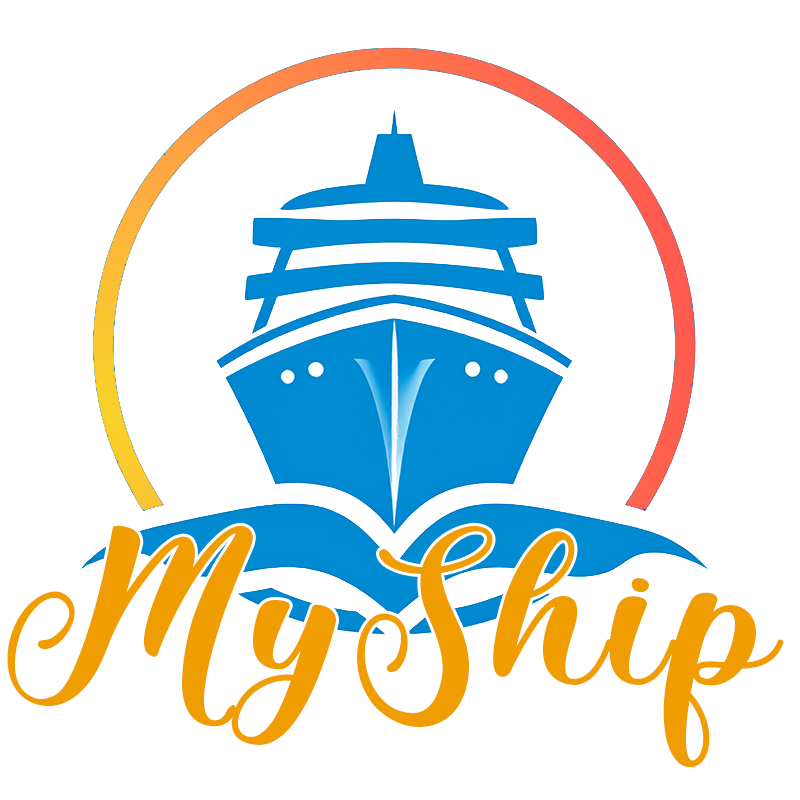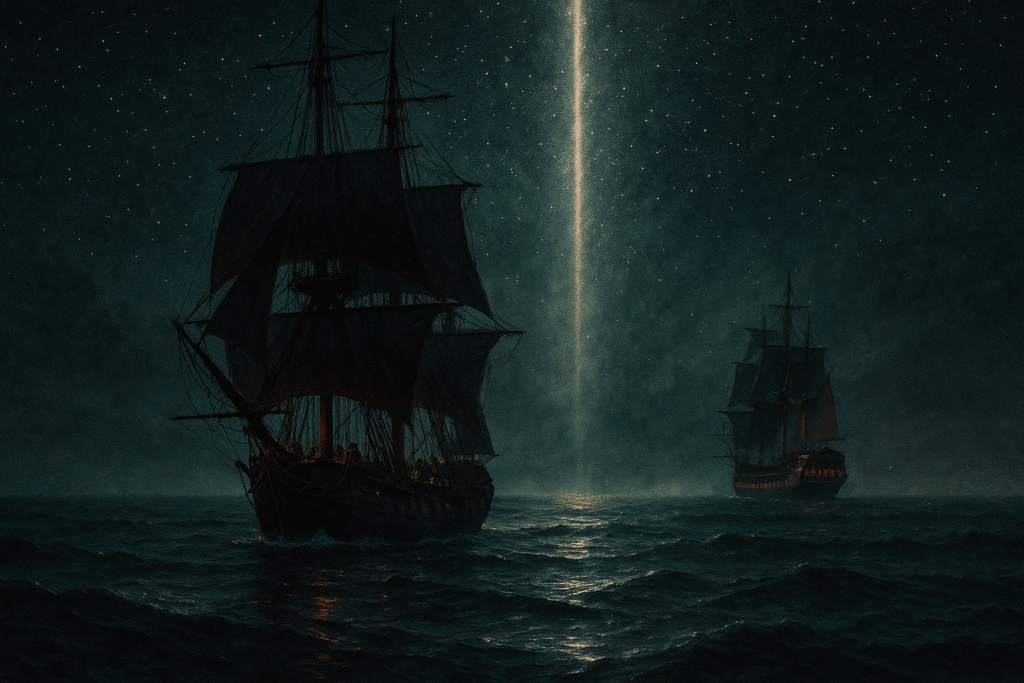
The seam didn’t glow so much as subtract the dark. A knife-edge of pallor lifted from south to north, too true for weather, too patient for lightning. On either side, stars kept different habits—to port, constellations arranged themselves into routes; to starboard, they marked currents like unrolled ropes. Between them, the seam stood up from the sea like a mast you couldn’t strike.
“Date-line,” Mireya said softly. “But kept by a church that never wrote a book.”
Finn raised the Oculus and held the THEN/NOW coin to it. The two faces refused to agree until he hinged them together. The seam deepened—a gate not in space, but in when. His palm pricked; a new knot inked itself along the life line: rolling hitch—made to grip a line that’s already moving.
“It’s not a door,” he said. “It’s a line you have to ride.”
Silas nodded once. “So we lash our keel to time and call it seamanship.”
Briggs set his jaw like a sail against a squall. “What’s the toll, then?”
“Tomorrow,” Finn said before he could be gentle. “A small one. Paid in a choice we won’t get to make.”
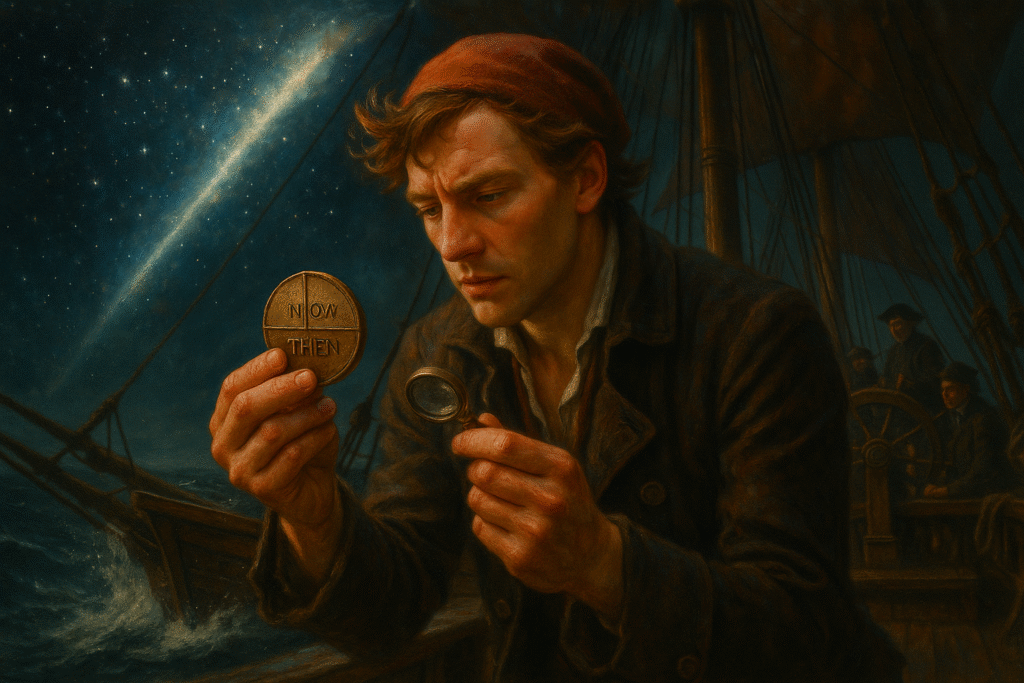
The Santa Lucía came up smart on their weather quarter, mirror bandaged, surveyors calm. Capitana Inés Valdés stood with hands light on the case, the posture of a duelist who knows patience is a weapon.
Mireya pointed the brig toward the seam with the kind of courage that spends itself tidily. “Hands to braces. Keep canvas honest. We don’t tack on a line like this—we consent to it.”
They hove toward the Rift. The sea around it flattened into polite bands, like lacquer laid in strokes. The wind sorted itself into two clean halves: to port an urging back, to starboard an insisting onward. The line offered no sound but a hum Finn felt in his teeth.
“Bind us,” Mireya said.
Finn looped the forestay with a line and tied the rolling hitch. It bit, then crept a finger, then bit for good, the way a proper hitch does when it decides to help. He felt the ship answer through soles and bones.
“On the seam,” Hayes breathed, and laid the wheel a hair to it. The brig settled with the obedience of a horse that likes the rider this hour if not every hour.
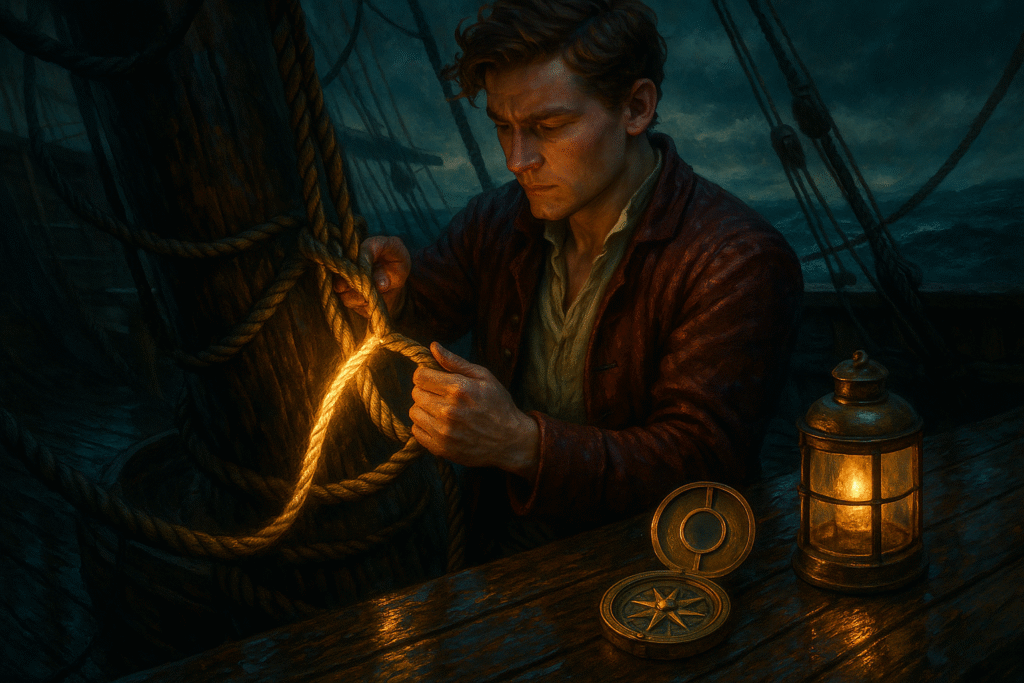
The Rift spoke without voice: Name the hour you will not live. The price was a coin you only get to spend once.
Silas’s jaw moved. He did not look at Finn. “I’ll pay,” he said. The line accepted the promise; something small in him—an option he’d been saving—went blue and blew itself out like a candle. The deck felt lighter for the weight he stopped carrying.
The Rift let them aboard.
They rode it: keel to light, chalk faint along the deck, sails trimmed to a wind that had forgotten compromise. To port, THEN—routes stars had promised once. To starboard, NOW—currents learning themselves in the dark. Ahead, a hollow where neither held dominion.
“Bridge the hollow,” Mireya said. “If we fall off, we—”
“—get yesterday on one side and today on the other,” Briggs finished grimly. “And no ship in the middle.”
The mirror flashed.
Valdés had chosen her own toll and paid it clean, because some enemies honor a place even when they mean to rob you in it. The Ash Mirror pinched the present a finger-width tighter, trying to pull the Crimson Horizon off the seam and into NOW where Spanish guns were sovereign.
Finn lifted the coin: THEN in his left, NOW in his right. He hinged them together so their disagreement became a third thing: a ghost word between faces—MEANWHILE. The seam purred, pleased by grammar.
“Sing me steady,” he said. Mireya set a low, unshowy chant. The crew answered on the beat that keeps men standing. Hayes held the wheel as if in church.
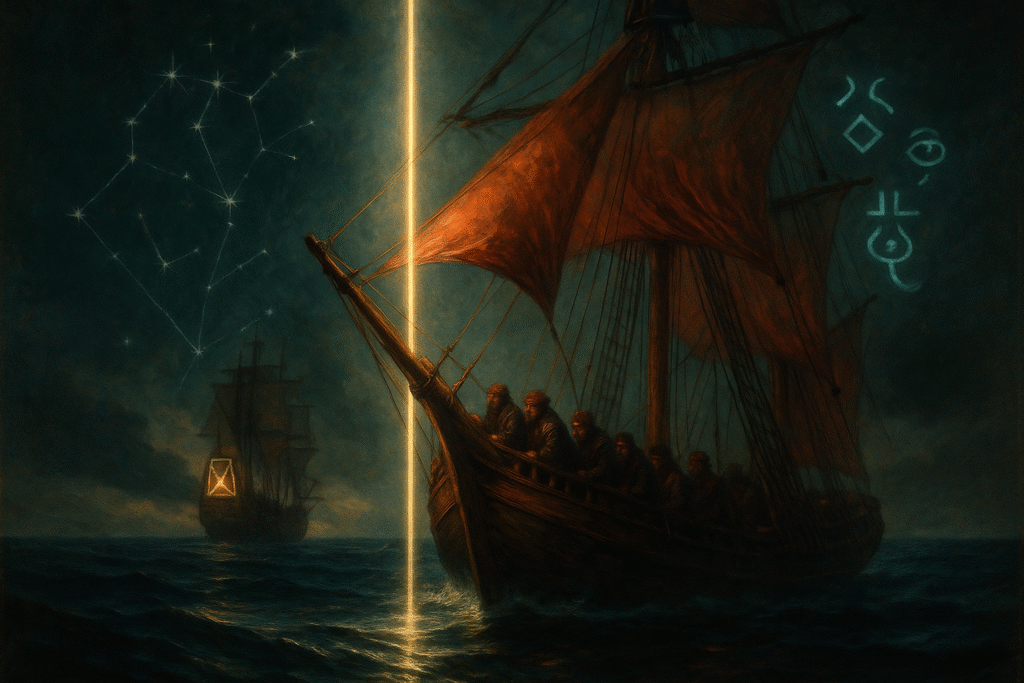
Halfway, the Rift lifted a spine: a raised knot in the line, like a whipping laid around a cable. On it were cut small notches—tithes men had paid. Finn didn’t read the names; he read the angles.
“Step up,” he said, as if the sea had stairs. Hayes gave the helm the inch required. The brig climbed—only by feeling—but the wake showed a raised scallop as if the ship had trod a thread.
The Santa Lucía found the same knot and took it like a parade ground—disciplined, beautiful, not clever. Her stern skipped a breath. The mirror’s case rattled.
“Now the hollow,” Mireya said, and her eyes didn’t leave the place where the seam went thin.
Finn set the coin on the star-compass. Mercury stood up into a hair-thin vane—THEN to port, NOW to starboard, MEANWHILE in the center. He placed the Oculus over it and the line flickered into something a man could trust for one minute.
“Three breaths,” he said. “No heroics.”
They took the hollow.
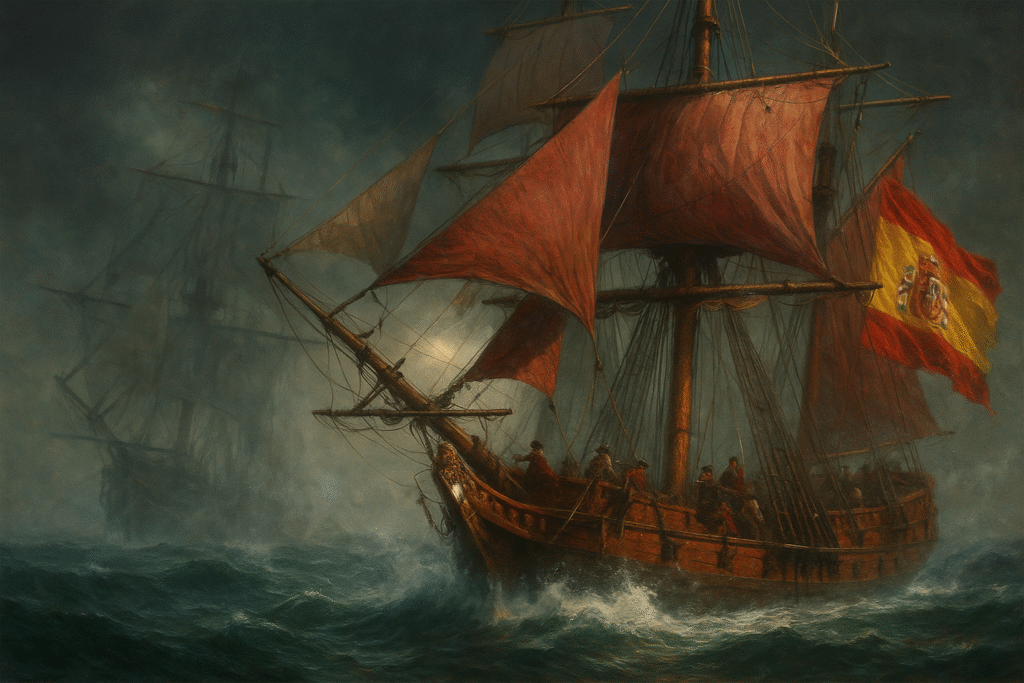
The ship felt weightless, not in the body but in the story. The rig stopped creaking, the planks stopped complaining, the water gave them back nothing. For a breath, Finn saw two Crimson Horizons—one where Silas had kept a lie a little longer, one where Mireya had not taken a command she didn’t want to want. Both faded like good dreams.
They came out on the far side with more ship than they’d had an instant before: not heavier, just more decided. The seam hummed approval.
Valdés refused to fall behind. The mirror’s cracked face took the MEANWHILE and shoved it at NOW, trying to make the line choose. The Rift punished force politely: her foretops’l backwinded of its own idea; a brace slipped a knot it had not tied. She didn’t curse. She set it again, neat as needlework.
“Price comes due,” Mireya warned.
The seam wanted tomorrow from someone. It preferred captains, but it took what navigators offered if offered well.
Finn offered a decision he’d wished to postpone: which chart he would trust when Mireya and Silas disagreed. He gave the answer away now—in favor of a rule, not a person. Trust the instrument that admits the cost. The seam liked the sound law and took it tenderly.
The rolling hitch in his hand warmed, then cooled. The brig settled into a new truth: less drift. The Rift lowered its spine and let them go.
They slid off the line.
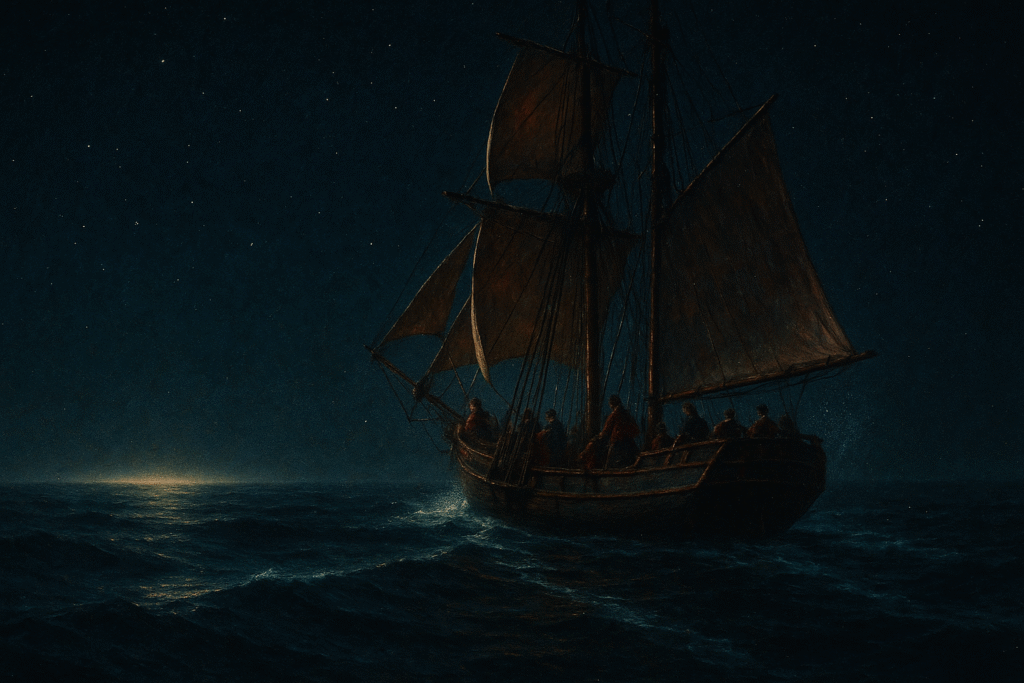
Behind them the seam hung unbothered, like a sword in a wall. The Santa Lucía came free a minute late and an inch angrier. Valdés stood with both hands on the mirror’s case and a smile the size of a knife notch.
A thing rose from the seam where no thing should rise: a bi-metal hourglass without sand, one bulb etched MORROW, the other EVE, joined by a throat of nothing. It didn’t float so much as wait. The brig rolled, polite as a bow; the hourglass dropped aboard as if gravity had asked it to dinner.
Briggs fetched it with the net. Finn touched it and didn’t lose any skin, which he took as approval.
“What does it do?” Hayes asked.
Finn lifted it by the EVE end; the MORROW bulb filled with probability—thin light falling like dust. He inverted it; EVE filled. The neck stayed empty. The hourglass didn’t measure time; it measured which time you were going to have.
“Navigation,” Mireya said, pleased in the way of people who collect tools. “And a vice. We’ll use it when we must and pretend we didn’t.”
“Course?” Silas asked.
Finn set the hourglass flat on the Prime, letting neither side choose yet. The star-compass mercury shaped a line he wouldn’t have believed yesterday: a black ribbon of still water curving like script into the west-by-south. The Oculus read a word written in the gaps between stars:
The Vesper Gyre.
Mireya rolled the word around her tongue like a coin. “Evening’s engine.”
Briggs thumped the rail, which often meant gratitude. “Sounds like supper.”
Silas set the wheel. “Gyre it is.”
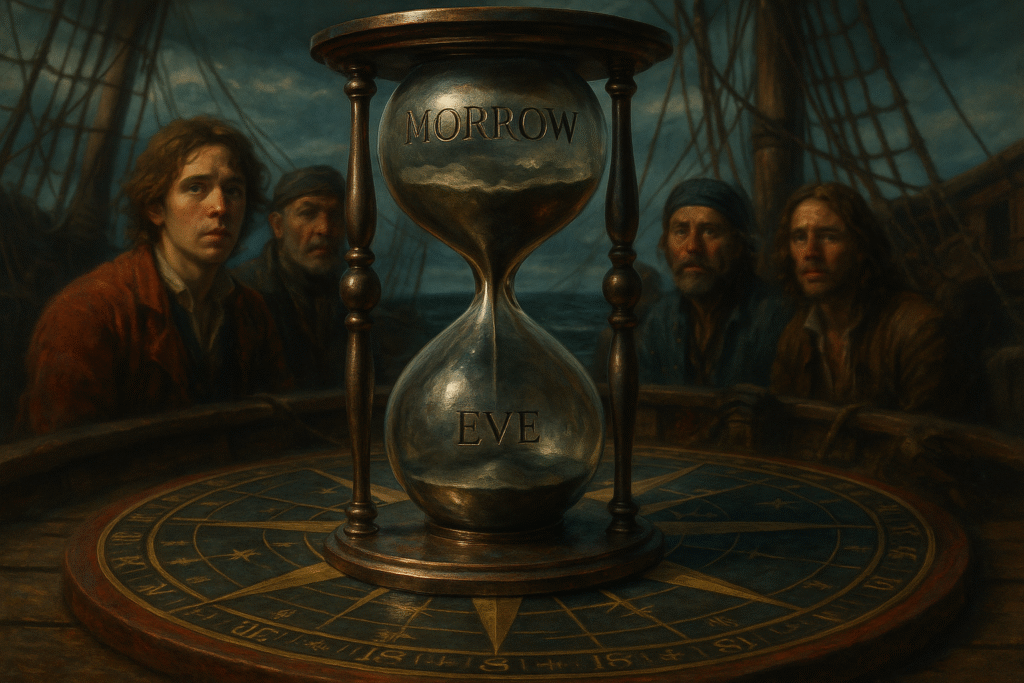
The Santa Lucía hailed, not to parley but to promise. “Blackthorne!” Valdés called. “You keep paying clever. I will keep paying more.”
Silas tipped his hat the respectful inch. “Then we’ll learn to owe smarter.”
Her laughter came across the water precise and brief, like a mark in a ledger. The frigate fell in astern at a distance that meant confidence, not carelessness.
Night deepened. The Rift thinned to a hair and lay down on the horizon like a tired blade. The brig slid into an evening current that curled the world gently to its shoulder.
The hourglass on the compass favored neither face, which is a kind of mercy. The serpent lock blinked once and looked pleased to be guarding anything worth stealing.
On the edge of sight, a pin-wheel of dark water turned lazily. Lanternfish lit spokes that were not there, and somewhere below, something hummed in fifths.
Finn lifted the Oculus and saw the Gyre’s center: a black iris the sea opens when it intends to dream.
“Hold us trim,” Mireya said. “We’ll want all our manners.”
“Tomorrow,” Briggs said.
“Tomorrow,” Silas agreed, and let the ship obey the kind of wind that remembers names.
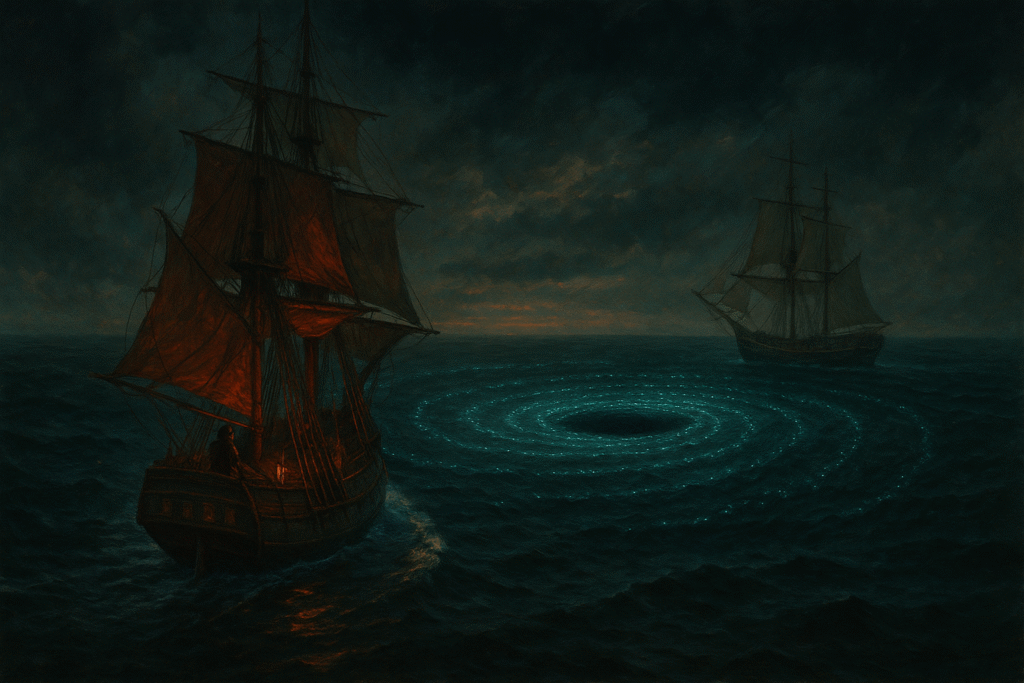
— To be continued —
